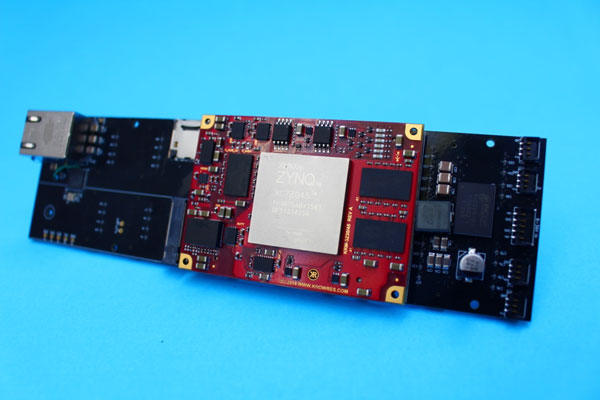
Tolo MEC System
Tolo's Modular Extensible Computation (MEC) system is an FPGA-based platform designed for processing large volumes of sensor data. Originally designed as the basis for an advanced aerial camera, it evolved through the design process into a flexible data processing system. The system is based around a central Zynq FPGA interfaced to 8 flat flex cable connectors. These FFC cables have power, ground, and diff pair data conductors on a standardized interface that allows the connection of any number of downstream sensor boards. If a particular sensor is needed for a specific client or application, we can build a new extension board that implements the FFC standard with the desired sensor.
The cables allow for significant flexibility in interfacing with a range of sensors, but not all sensors can connect directly to the central Zynq via this system. Some, like our Ext183 board, use an onboard FPGA for primary processing of the data, and this FPGA relays the data back to the central Zynq for centralized decision making. This FPGA to FPGA communication (designed with custom Verilog IP) enables the MEC system even more flexibility: two MEC processing boards can communicate with one another over the FFC interface, and thus double (or more) the available sensor ports.
Large volumes of data generation and processing usually require large volumes of data storage. The MEC system is equipped with NVMe SSD's, enabling throughput of up to 3 GBps. The flexibility of the modular sensor system paired with high volume data storage makes the MEC system a perfect fit for Tolo's aerial camera, and many other client applications.
- From a technical standpoint, I designed this board with KiCAD. KiCAD is an amazing application, handling this 10 layer board with hundreds of diff pair signals with ease. I found the diff pair routing tools (length matching, pair deskew, etc) particularly helpful, and the 3d modeling features saved us from several mistakes. KiCAD is not without its quirks, and like any design tool, mastery requires practice. But I believe KiCAD deserves more respect amongst the engineering community than it currently gets. *